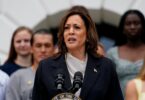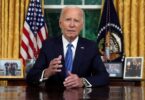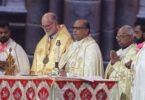
Hannah Smith, a lawyer with the Becket Fund for Religious Liberty, speaks on a March 22 panel at the Newseum in Washington about the legacy of Justice Antonin Scalia, who died Feb. 13. The panel concluded that even without Scalia, there’s still hope for a strong religious liberty advocate on the U.S. Supreme Court. (CNS photo/Maria Bryk, courtesy Newseum)
by Kurt Jensen
WASHINGTON (CNS) — Even without Justice Antonin Scalia and with the likelihood of deadlocks by an eight-member Supreme Court for some time to come, there’s still hope for a strong religious liberty advocate, a panel of speakers concluded.
And the next leading light on the issue might be Justice Elena Kagan, who typically disagreed with Scalia’s statements.
That was the conclusion of Hannah Smith, a lawyer with the Becket Fund for Religious Liberty. She spoke at a recent discussion of Scalia’s legacy at the Newseum in Washington.
Scalia’s views on the prominence of religious faith in American public life were his trademark. “He really didn’t hold anything back,” Smith said. “He had a very clear idea that religion must be protected on the public stage.”
Scalia went further than that in his last public speech Jan. 2, just over a month before his unexpected death at a Texas resort.
He told his audience at Archbishop Rummel High School in Metairie, Louisiana, that the idea that government must be neutral between religion and an absence of religion had “no place . . . in our constitutional tradition.”
“Where did that come from?” he asked. “To be sure, you can’t favor one denomination over another but can’t favor religion over non-religion?”
“God has been very good to us,” he continued. “That we won the Revolution was extraordinary. The Battle of Midway (in World War II) was extraordinary. I think one of the reasons God has been good to us is that we have done him honor. Unlike the other countries of the world that do not even invoke his name, we do him honor. In presidential addresses, in Thanksgiving proclamations and in many other ways.
“There is nothing wrong with that and do not let anybody tell you that there is anything wrong with that,” he said.
“I disagree with almost everything that Justice Scalia did,” said J. Brent Walker, executive director of the Baptist Joint Committee for Religious Liberty. He said the Establishment Clause of the First Amendment does not specifically favor religion, but rather, religious liberty for all.
The example that gave Smith so much hope for Kagan was in the 2011 oral arguments in Hosanna-Tabor vs. Equal Employment Opportunity Commission.
A teacher who had been fired by Hosanna-Tabor Evangelical Lutheran School in Redford, Michigan, challenged the “ministerial exception” of the Civil Rights Act. The exception prohibits most employment-related lawsuits when employees perform religious functions at schools. The teacher, Cheryl Perich, was what is known as a “called” teacher, having met criteria of the church for a level of religious training.
Hosanna-Tabor argued that because Perich taught some religion classes, she was a ministerial employee and therefore exempt from federal law.
Chief Justice John Roberts asked Leondra Kruger, the government’s attorney, whether the court could accommodate even a limited ministerial exception. Kruger responded that the justices should make no distinction between religious employers and those with “expressive associations.”
“That’s extraordinary . . . that’s extraordinary,” Scalia retorted.
Kagan, “to her credit,” Smith noted, jumped in as well: “I too, find that amazing, that you think that . . . neither the Free Exercise Clause nor the Establishment Clause has anything to say about a church’s relationship with its own employees.”
“There’s nothing in the Constitution that explicitly prohibits the government from mucking around in a labor organization,” Scalia said, adding, “There — black on white in the text of the Constitution — are special protections for religion. And you say that makes no difference?”
The court eventually ruled unanimously in favor of the school, saying that churches, their schools and other religious groups “must be free to choose their teachers and employees when their primary duties consist of teaching, spreading the faith, church governance, etc., without government interference.”
Regardless of what happens with President Barack Obama’s nomination of Chief Judge Merrick Garland, of the U.S. Court of Appeals for the District of Columbia Circuit, to replace Scalia, “I think what we should be hopeful for is that we have justices like Justice Kagan who said, ‘I, too, find that remarkable,'” Smith said.






